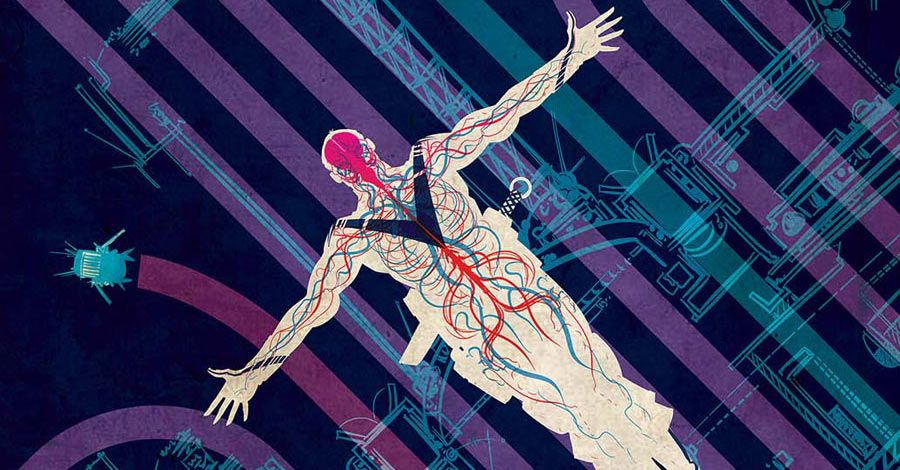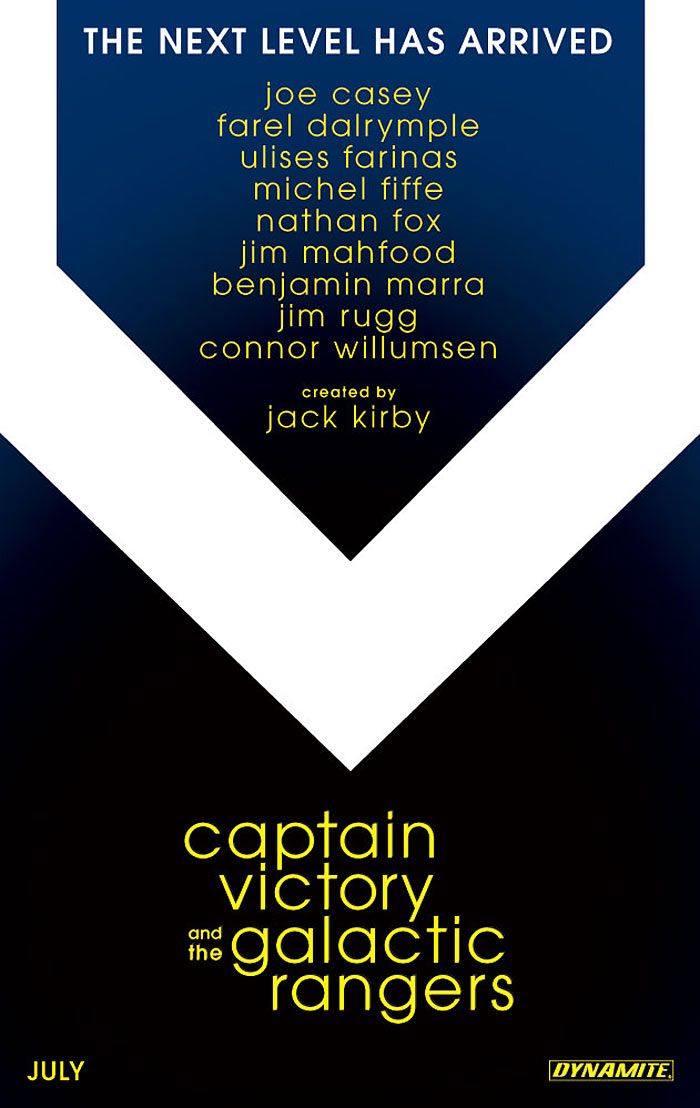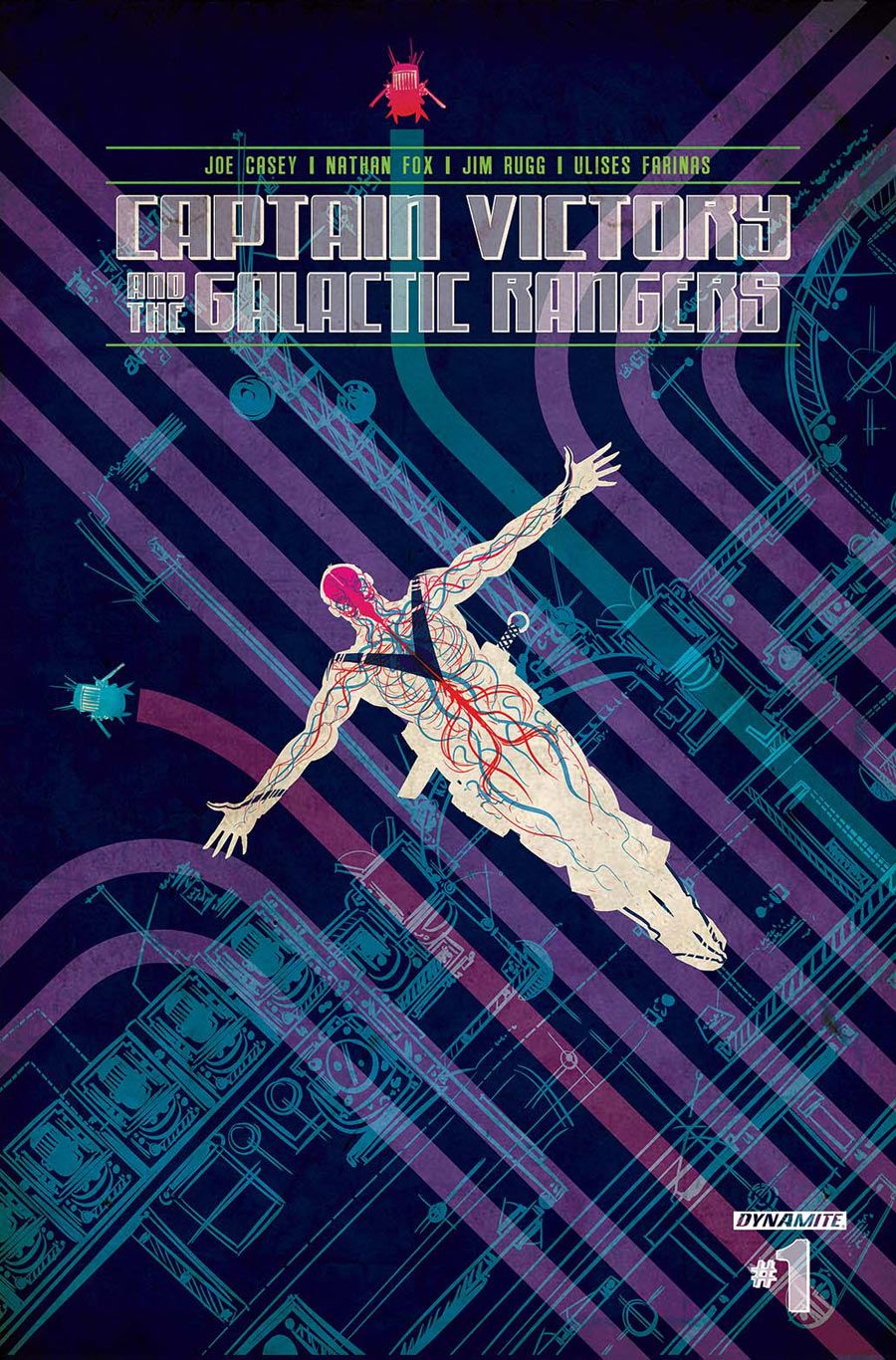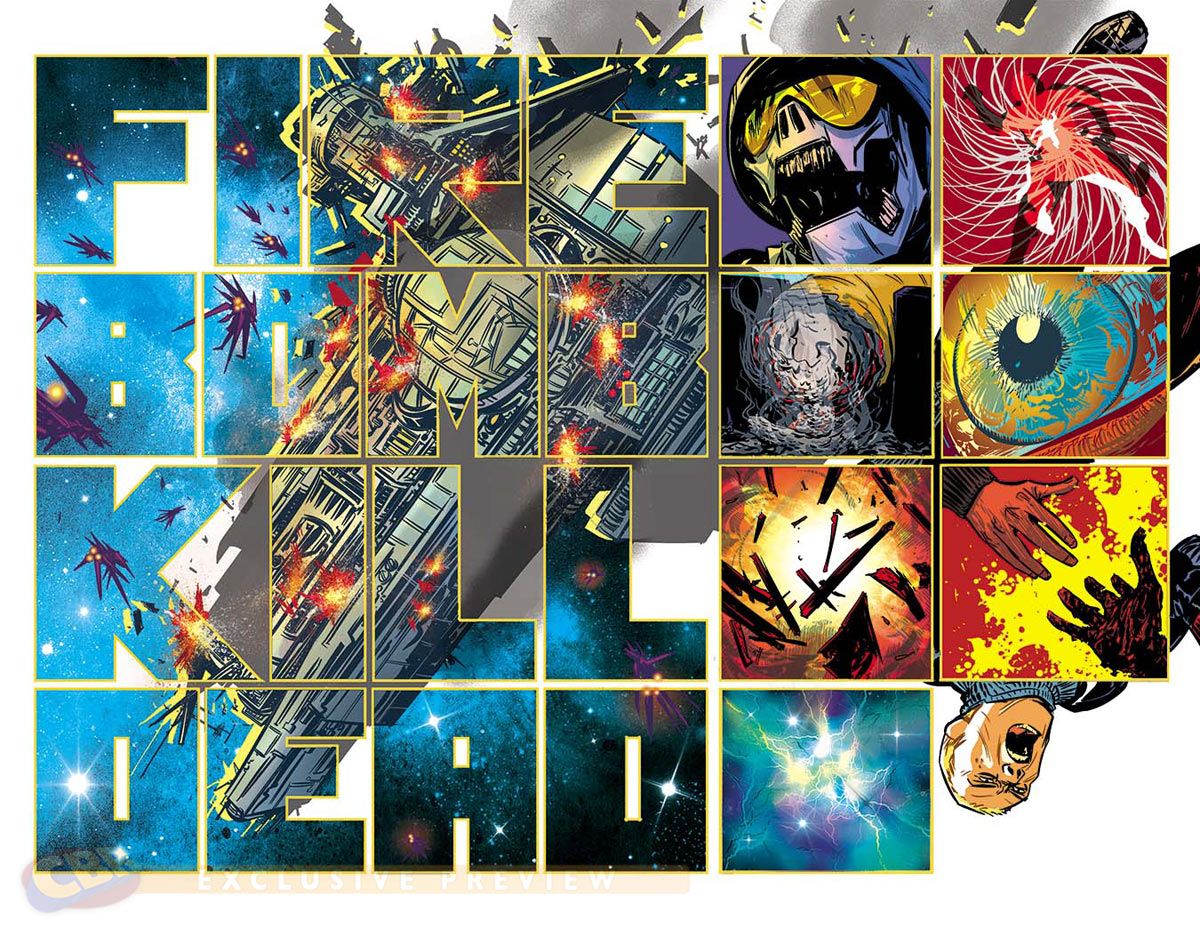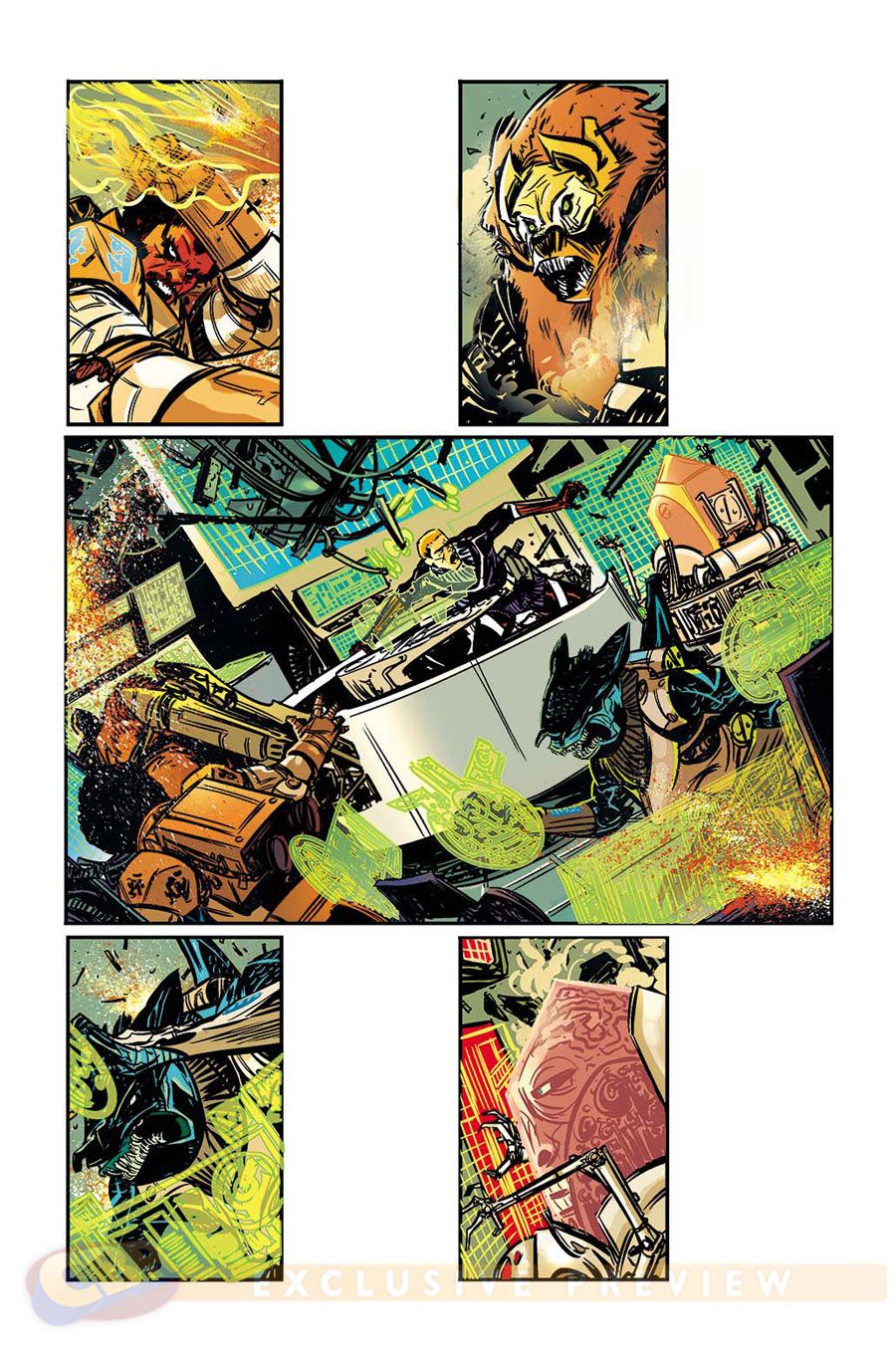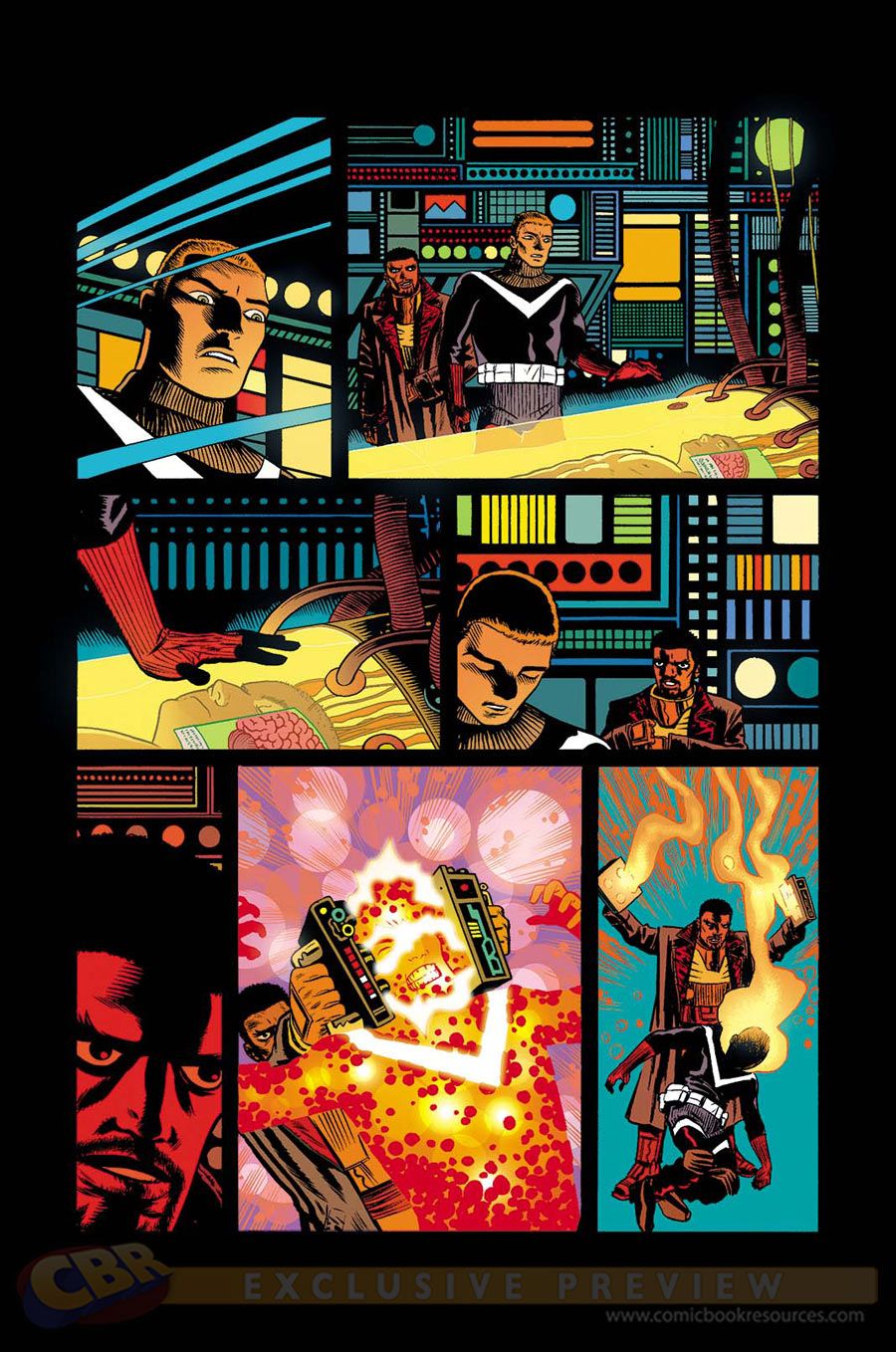It goes without saying but bears repeating: the work of Jack Kirby will never be improved on.
But for Kirby fanatic and veteran comics writer Joe Casey, there's still work that can be done to keep the King of Comics' innovative flame ablaze. Casey's latest effort on that front is "Captain Victory and The Galactic Rangers" -- an August-shipping Dynamite Entertainment relaunch of the early '80s creator-owned title that proved one of Kirby's last wholly original creations. While the story of a space-faring superhero and his misfit band has been revived a few times in the past, this latest series invites a number of groundbreaking indie and alternative cartoonists to help Casey tell a new story of the Captain. Issue #1 sports art by frequent Casey collaborator Nathan Fox, "Afrodisiac" artist Jim Rugg and "Judge Dredd" artist Ulises Farinas, and future issues of the book will welcome "Copra's" Michel Fiffe, longtime indie artist Jim Mahfood, "Night Business" creator Benjamin Marra, acclaimed illustrator Farel Dalrymple and webcomics maker Connor Willumsen.
CBR News spoke with Casey about "Captain Victory and The Galactic Rangers," and below the writer gets into the impact Jack Kirby's original series had on him as a young reader, what his collaborators will and won't do in the style of the King, how the entire team is telling one epic story and why Kirby's greatest legacy might just be his outsider status.
CBR News: Joe, the original "Captain Victory" series was the first in Kirby's last big push of original comic serials which included the significant Steve Gerber collaboration "Destroyer Duck" and insanely inventive "Silver Star." What's your first connection to that period of his career as a reader, and what do you think of those comics now having read and interacted with so much of his work professionally?
Joe Casey: The true significance of Kirby's "Captain Victory," for me, is something that can only be quantified in hindsight. And that's mainly to do with my age. When I first picked it up in 1981, I was way too young to have any sense of comics history -- and I was certainly unaware of the publishing politics in flux at the time, when the shift from newsstand sales to the Direct Market was just starting to happen. I just saw a cool comic book and picked it up, read it and loved it. I'm not sure I even knew from Jack Kirby at that time, in terms of how important he was to the medium. I just know that I flipped through issue #2 (the first one I got) and said to myself, "Now this is a motherfucking comic book!" I didn't fully realize how cutting edge it was, compared to the Marvel and DC comics I was used to.
But as I got older and quickly became more aware of how the industry worked, how its history had played out, it became obvious that there wasn't a time when Jack Kirby wasn't on the cutting edge. And not just through his work, creatively -- "Captain Victory," simply as a publishing event, is significant in that it was one of the first creator-owned, Direct Market-targeted comic books that took on the Marvel/DC establishment and tried to beat them at their own game. Pacific Comics made a real play at the time and, even now, I get excited thinking about it. So on a very real level, "Captain Victory" -- the comic book -- significantly legitimized the existence of the Direct Market and helped establish it as a more fiscally viable approach to selling product, which in turn changed the entire comic book publishing industry in a way that we're all still benefitting from today. So, again, we owe Kirby our thanks.
As a professional, I took a pretty keen interest in how Kirby's career evolved over the years. You hear stories -- apocryphal or not -- about how Marvel staffers were openly disdainful of Kirby's work in the mid- to late '70s, how they felt his comics -- now-classics like "Captain America," "2001," "Black Panther," "Devil Dinosaur," "Machine Man," "The Eternals" -- didn't measure up to other things that were going on at the time. Obviously, whoever felt that way was completely and utterly fucked in the head, because even Kirby's so-called "lesser" works -- if there even are such a thing -- have an energy and a spirit that no other comic books had. But, y'know, he took a lot of shit from people -- yet he kept moving forward, kept working and kept pushing himself and the medium. He wouldn't let himself be bullied by Marvel's archaic business practices in the '80s, and subsequent generations of creators benefited tremendously from the battles he fought. We still are, actually.
This is all a long-winded way of saying it's a real honor to be working on this book in particular, and it means a lot to me, personally.
That said, when it came to thinking about "Captain Victory" as a platform for new stories of your own, what was the element of that series that connected with you? Was there a particular theme or idea in Kirby's work that you wanted to develop with your own voice?
Aside from the mix of childhood love and professional appreciation, "Captain Victory" shares many virtues with most of Kirby's other creations. Conceptually, it's pretty goddamned commercial and a little idiosyncratic at the same time. The themes that he worked with were almost always mythic in nature, and that certainly appeals to me. I like the Big Ideas.
Being the guy who's taking the reins and moving it forward from here (at the moment, anyway), the main responsibility as I see it is to keep on pushing the envelope. To take this material and, for lack of a better term, test it. To take these concepts and squeeze all the juice out of them that I can. With Kirby's stuff, it's not easy -- because he did it first and he did it best. But, y'know, we're still in there swinging for the fences.
RELATED: Casey & Richardson Get Weird with "Catalyst Comix"
I'm sure that a lot of people who see the lineup for this series are going to look at it and get a similar vibe to what you did on the recent "Catalyst Comix" series at Dark Horse with its wide range of art talent not typically associated with work for hire superheroes. Do you think the two projects share a kind of DNA? Or are they significantly different in a way folks might not expect at first blush?
I have to say they're pretty different, when it comes to both content and execution. "Catalyst Comix" was a straight-up anthology series, each issue told fairly condensed, compact stories. "Captain Victory" is one, huge epic tale that's using a diverse array of artists to tell it. When it comes to the artistic talent involved, I see what you mean about sharing DNA, so I suppose this book takes the aesthetic approach that we took in "Catalyst Comix" to the next level. It's a giant leap, in fact.
Joining you for issue #1 are Nathan Fox, Jim Rugg and Ulises Farinas. Can you tell me a bit about what each of them are tackling at the story's start? Did you write certain segments of the book with each of them in mind, or once you broke out the story did different guys call out what they wanted to draw?
A bit of both, actually. I had the overall story mapped out, but it was pretty obvious which artists would match up to which areas of the story. And I left plenty of room for the different collaborations to occur organically, to add to the story in very cool ways. That goes for the other artists in subsequent issues, as well.
From the art we've seen so far, while there are some Kirby-esque flourishes in certain sequences ("krackle" and design work and the like), it's clear that you guys weren't approaching this as a straight stylistic homage or "cover version" of his original work. Did you discuss with Dynamite or your artists beforehand how close or maybe how far you wanted to stray from the kind of thing you did on "GODLAND", for example?
This series had to be its own thing. It has to stand on its own merits. We're not a cover band -- and for me, personally, I'm not looking to repeat myself, either. It's the primary reason I recruited these artists specifically. We're doing the best Kirby tribute we could imagine by simply doing our own thing, in our own way. That's the Kirby ethos in a nutshell, isn't it? "Do it your way and do it the best you can."
Like I said above, many of the guys you have coming up as artists on the series are coming to this kind of gig for the first time - Marra, Fiffe, Willumsen -- and even guys like Mahfood and Dalrymple who have done superhero work are extremely selective in the gigs they take on. Was assembling this team an easy task because it was a Kirby character, or did you headhunt your collaborators with a specific story pitch? And what are some of their particular incoming contributions that you feel accomplish what you'd hoped when this project started up?
The way I pitched this to Nick Barrucci was that it would take a small army of artists to match up to one Jack Kirby. So, the idea of this "dream team" of artists was there from the beginning. I wouldn't have done it, otherwise.
Plus, as you mentioned a few questions ago, I've been on this tear in the last few years to see artists who aren't normally tapped for the so-called "mainstream" gigs drawing these more recognizable properties. Remember, I'm the guy that got Eddie Campbell and Ashley Wood drawing major sequences in "Uncanny X-Men" #400, way back in 2001. And that was just the beginning for me. From Eric Canete on "Iron Man" to Nathan Fox on "Zodiac" and "Haunt" to the artists on "Catalyst Comix" to these guys on "Captain Victory," it's fun to subvert expectations a bit -- both the readers' and the industry's, in general.
And, y'know, it's nice to see that things have started to catch up with me and my occasional, overblown rants on this subject. Marvel, especially, has finally broken away from their established stable of artists and given more individualistic talents a chance to shine, and on books that really matter. DC, not so much, but we're just at the beginning here. In fact, Skottie Young's incredible success with "Rocket Raccoon" should really be a big fat signal to everyone on what the marketplace -- and the wider readership -- can handle now. Even though I know all the inside baseball details that contributed to its high order numbers, it's still impressive to me and if we can use it to push more artistic diversity, then fuckin' A.
For "Captain Victory," some of these artists I'd known and worked with already, so it was an easier pitch to get them onboard. Others I didn't know personally, but their appreciation for Kirby and, in some cases, the original "Captain Victory" series, made it a pretty smooth sell.
I gotta' say, one of the proudest moments in my career to date was the original announcement of the book and the talent line-up involved. Just being on that list gave me a buzz I fed off of for weeks after. I'm just such a fan of each of these artists' work, it's an honor to collaborate with them. In some instances, it's almost embarrassing, since I consider most of these guys to be much more interesting writers than I usually am. But, y'know, I can get past that for this particular project. As we've been moving through the series, their contributions have far exceeded my expectations. Issue #1, with Fox, Rugg and Farinas all in there, is a thing of rare beauty. Michel Fiffe's pages in issue #2 are amazing. I'm just now writing a sequence for Benjamin Marra in issue #4 -- an untold tale of Captain Argas Flane -- and it's going to be a killer.
For me, it's also been great just to talk to these artists about the comics we love, sharing our influences and idiosyncrasies -- while also discovering our common ground -- and turning each other on to new and different things. It's one of the best parts about this gig.
I know one aspect of the series that's pretty intriguing is how you're hoping to push the Captain Victory concept forward with some new ideas and some new characters. When it came to building on Kirby's established mythology, what became most important to you as a writer, and who amongst your artists took point on designing new cast members?
I'm not sure if I would go so far as to say "new ideas", because Kirby's original ideas were already as strong as they come. What we're doing is looking at those original concepts in a new way, a way that reflects where we are as creators in 2014 (and hopefully beyond). I think trying to recreate 1981 in any way, shape or form would be a fairly meaningless exercise, especially when you take the long view on these things (as I try to). What's most important -- on the writing side, especially -- is to make sure we're being as relevant as possible, not just for right now, but for as long as this thing is in print.
Having said that, we did go through a preproduction period of redesigning a few things, mostly to give some of the characters a bit of spit and polish. Lt. Orca no longer looks quite so much like the Inhumans' Triton, for instance. Nathan Fox took the lead on that, but a lot of the artists are responsible for the characters that show up in their individual sequences.
Plus, there are aspects of the Captain Victory concept that we're trying to explore from maybe a slightly different angle than Kirby did. He tended to gloss over the emotional impact of his own ideas, their impact on the characters themselves. And it totally worked for the tone of his stories. But for what we're doing, it was necessary to try and go a little deeper.
Overall, we all know there are a lot of comics out there that are primarily driven by a desire to keep certain ideas alive -- or if you want to be absolutely cutthroat about it, "intellectual property management" -- but Kirby as an example for everyone rarely took on a gig that he didn't bring a piece of himself to. As someone who's done a wide range of comics gigs over the years, what is the personal element you want to accomplish with "Captain Victory"?
On the side of keeping an IP "alive," I don't think too much about that. But if and when I do, I take great solace in knowing that the Kirby estate fully owns "Captain Victory" and all its related concepts. I guess that's why it doesn't weigh too heavily on my mind, because I know all is right with the world, as far as this particular property is concerned.
So, personally, I just want to do a good comic book. A great one, in fact. I mean, why shouldn't we strive for greatness here? Why else would we do it, if we didn't want it to be the hottest thing going? Ambition is a good thing. And, believe me, I'm not talking about sales. Dynamite doesn't have the marketing muscle to do a PR carpet bombing like a Marvel or a DC can, and we're not falling back on a gazillion variant covers to generate higher order numbers, either. It's all down to the concept and our ability to realize our collective vision. So far, so good. I'm well aware that this approach isn't going to be for everyone, but that's a hallmark of a lot of my work -- not to mention a lot of my favorite comic books over the years, too. We're making a strong statement here, just in the way we're doing this series -- and it's one I'm particularly proud to make.
"Captain Victory and The Galactic Rangers" #1 goes on sale August 6 from Dynamite Entertainment. Check out a preview of issue #1 right here on CBR.

